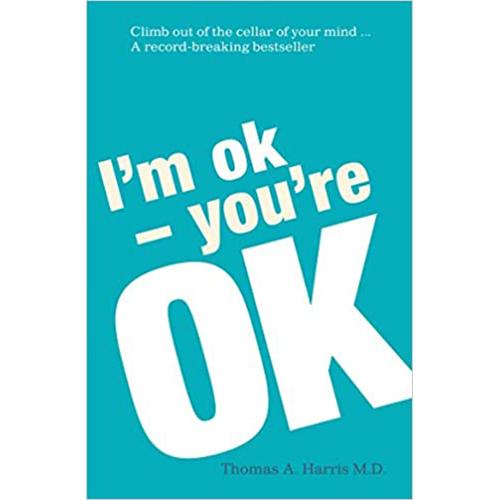Thomas A. Harris
I’m Ok - You’re Ok

I’m Ok – You’re Ok is a great book as an introduction to
transaction analysis, much better than Games People Play. Harris places
a special focus on the Parent, Adult, Child (PAC) model in which the Parent is a
mental state where we act or speak from being influenced directly from adults. These
tend to be things that the child was expected to believe unquestioningly. Some
of these are valid and some not, for instance ‘Never run out in traffic’ or
‘Premarital sex is wrong’. The Child is the same sort of thing however it
refers to how life felt like as a child. Therefore, Harris says that whenever
we act from the Child, we’re reliving memories yet the stimulus for reliving
them may not be relevant or helpful anymore. The Adult however is the part of
you that has somewhat rationally assessed their environment and makes decisions
as to the usefulness of certain ideas or ways to act and speak. Harris argues
that the Adult develops over time however various situations can bring out both
the Parent and Child in various forms. This all seems a bit Freudian, but
Harris does a better job at explaining than me.
Harris goes on to introduce four different life positions. These are:
1. I’m Not OK, You’re OK
2. I’m Not OK, You’re Not OK
3. I’m OK, You’re Not OK
4. I’m OK, You’re OK
I’m not going to explain them here otherwise this will get a bit longer than I want it. If you want a quick explanation of them, I’d recommend the Wikipedia page. Then if that gages your interest the book is definitely something you should read.
I really enjoyed this book and I’ll probably read it again at some point to refresh my memory and probably write more about it. I find transaction analysis to be such an interesting concept and something I want to understand more. I’d recommend to anyone who’s interested in the human condition and psychology.
Harris goes on to introduce four different life positions. These are:
1. I’m Not OK, You’re OK
2. I’m Not OK, You’re Not OK
3. I’m OK, You’re Not OK
4. I’m OK, You’re OK
I’m not going to explain them here otherwise this will get a bit longer than I want it. If you want a quick explanation of them, I’d recommend the Wikipedia page. Then if that gages your interest the book is definitely something you should read.
I really enjoyed this book and I’ll probably read it again at some point to refresh my memory and probably write more about it. I find transaction analysis to be such an interesting concept and something I want to understand more. I’d recommend to anyone who’s interested in the human condition and psychology.